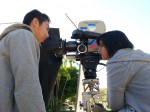With concerns about how his art will be perceived on campus, director and writer Ryan Jow said he hopes he has a piece of art with a statement in his hands.
With less than a week remaining to reach its Kickstarter funding goal, “The Martyr,” an undergraduate student thesis film project, carries with it multiple statements about the issues of Islamophobia, the separation of faith and identity as well as film stock – the outdated medium on which it was shot.
As its crew undergoes editing scrutiny before Tuesday’s submission deadline for the UCLA School of Theater, Film and Television Film Festival, there are worries about how its art will be received.
“My hope is that people at UCLA will recognize that this is something UCLA should strive for in terms of limits and creativities in the film program,” said Jow, a fourth-year film student. “I hope people at UCLA can ultimately make judgments for themselves in what that means to them.”
“The Martyr” follows Isma’il (Tarek Elhadary), a Muslim-American university student with an explosive vest strapped to himself. Through nonlinear scenes jumping between the past and present, details are given about Isma’il’s relationship with his father (Sayed Badreya from “Iron Man”) and what challenging circumstances have lead to this climactic moment.
Fourth-year film student Nerris Nassiri, who serves as producer of “The Martyr,” said he thinks that, in terms of both production value and overall message, the film is one of the most ambitious that UCLA has seen in a while. He said that the film’s trailer has received supportive reception, regardless of viewers’ ethnic or religious background.
“We presented the trailer to (an Undergraduate Students Association Council) meeting and just before we went, there were two or three speakers talking just about Islamophobia; it’s a running theme,” Nassiri said. “People will present themselves in different ways. We just happen use narrative filmmaking as a medium and let it speak for itself.”
Jow said the idea of writing a script about these issues stemmed from his fascination with world news growing up. Seeing his Muslim and Arab friends being persecuted for their heritage, religion or who they were was something he said he took notice of as an intrinsic characteristic of the millennial generation.
“I think a huge population of Muslim students at UCLA and the groups that support and encourage them will welcome this film as one of many steps in talking about marginalized groups in any sector,” said Rafe Blood, a fourth-year film student and first assistant director on “The Martyr.” “Narrative films are at the crux of social change, and this is one of those films that I think will be a contributing factor.”
“The Martyr” was shot on 35mm film print, as opposed to digital which is the current standard for filmmaking. Jow said he received rare permission for the project after heavy amounts of petitioning and grants for equipment.
“35mm has always been this huge monster that no one really wanted to entertain for undergraduate films,” Jow said. “Things that support film are starting to get outdated at Melnitz Hall, which is also reflective of how the medium is outside the school.”
Jow, Nassiri and master of fine arts student Julia Swain, who serves as the film’s director of photography, all said their individual opinions on the use of 35mm film in UCLA thesis projects waver between favorable and dubious.
Each considered film stock’s ability to display a wide range of colors and exposures of which digital equipment is not capable, but also the extreme cost and time requirements.
Nassiri said that, in the film, Isma’il goes through such a range of emotions and transformations of character that “The Martyr” is a story that had to be told in 35mm.
“It’s important with a thesis film to be able to choose your format,” Swain said. “We were willing to do whatever it takes because we cared that much. As long as a student understands the workflow and the consequences that come with whatever format they’re going to choose, I don’t see harm in providing support.”
Jow said most of the funds from the film’s Kickstarter will be put towards fees for submitting “The Martyr” to film festivals. He is currently looking to participate in a range of international festivals, from those in the Middle East and Europe to his hometown of San Francisco.
Still, Jow said he is more nervous for the film’s reception at UCLA than he is outside of the campus due to the sensitivity of the college climate. He said he would like for the product to be recognized as a vision that started at UCLA and as an open dialogue for people across the world, if he can get it that far.
“The main statement that I want people to take away is that there are two sides to every story,” Jow said. “My hope is that it does make some sort of impact in how people look at themselves, how they look at others and what kind of conclusions they can make.”

So this film lionizes terrorists? That’s lovely. And the same students whine about Islamophobia? What a joke.
Are the Jew-hating groups like SJP, CAIR, and MSA funding this?